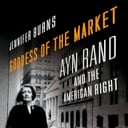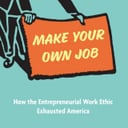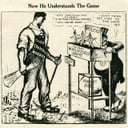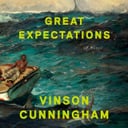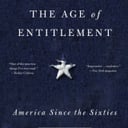
Christopher Caldwell's Case Against Civil Rights
Attentive listeners will notice that this episode is about a book but isn't an author interview. That's because it's the first in a new occasional series of episodes that will be dedicated to books by conservative writers that we think are important — whether because a book articulates the right's approach to an issue or problem in an especially revealing way, influenced or galvanized the conservative movement when it was published, or, with the benefit of hindsight, has proven to be prescient about where the right, and perhaps the country, were heading. Many of these books will be from decades past, but our first selection is more recent: Christopher Caldwell's 2020 broadside against the 1964 Civil Rights Act and what it wrought, The Age of Entitlement: America Since the Sixties. Caldwell argues that the apparatus created by civil rights legislation and the federal courts in the 1960s amounted to a new, second constitution that displaced the one Americans had lived under since the founding, one that jettisoned traditional liberties like freedom of association and replaced democratic self-government with rule by bureaucrats, lawyers, and judges. Who has access to these new levers of power? Not the working class whites who are neither a favored racial or ethnic minority — a person of color — nor a member of the progressive elites who preside over the new regime. Much of The Age of Entitlement is dedicated to tracing the effects of civil rights legislation when it comes to the causes that arose in its wake: feminism, immigrant rights, gay marriage, and more. But the book is equally a brutal examination of the legacy of the Baby Boom generation (and, by extension, Ronald Reagan, whose presidency they powered), that most "entitled" of generations, whom Caldwell deplores for wanting to have their cake and eat it, too. Boomers, in Caldwell's telling, refused to straightforwardly reject the second constitution and its distributional demands, while also insisting petulan...

Christopher Caldwell's Case Against Civil Rights
Attentive listeners will notice that this episode is about a book but isn't an author interview. That's because it's the first in a new occasional series of episodes that will be dedicated to books by conservative writers that we think are important — whether because a book articulates the right's approach to an issue or problem in an especially revealing way, influenced or galvanized the conservative movement when it was published, or, with the benefit of hindsight, has proven to be prescient about where the right, and perhaps the country, were heading. Many of these books will be from decades past, but our first selection is more recent: Christopher Caldwell's 2020 broadside against the 1964 Civil Rights Act and what it wrought, The Age of Entitlement: America Since the Sixties. Caldwell argues that the apparatus created by civil rights legislation and the federal courts in the 1960s amounted to a new, second constitution that displaced the one Americans had lived under since the founding, one that jettisoned traditional liberties like freedom of association and replaced democratic self-government with rule by bureaucrats, lawyers, and judges. Who has access to these new levers of power? Not the working class whites who are neither a favored racial or ethnic minority — a person of color — nor a member of the progressive elites who preside over the new regime. Much of The Age of Entitlement is dedicated to tracing the effects of civil rights legislation when it comes to the causes that arose in its wake: feminism, immigrant rights, gay marriage, and more. But the book is equally a brutal examination of the legacy of the Baby Boom generation (and, by extension, Ronald Reagan, whose presidency they powered), that most "entitled" of generations, whom Caldwell deplores for wanting to have their cake and eat it, too. Boomers, in Caldwell's telling, refused to straightforwardly reject the second constitution and its distributional demands, while also insisting petulan...
















